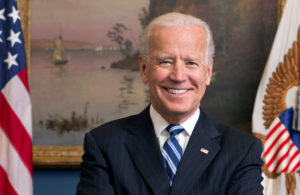
[Joe Biden photo from Wikipedia]
What a Biden presidency would mean for the pharmaceutical industry continues to be an open question as the Senate outcome remains undecided, but two broadly similar outcomes are likely.
Ultimately, neither a Biden nor Trump administration would likely have safeguarded pharmaceutical companies’ profitability, although the industry donated considerably more to the former than the latter. President Trump has alternately lionized and pilloried the pharmaceutical industry.
The trade associations Pharmaceutical Research and Manufacturers of America (PhRMA) and BIO have released statements asserting their commitment to working with the new administration to address COVID-19 and other ongoing health challenges. BIO’s Dr. Michelle McMurry-Heath also congratulated the president-elect Biden while praising Biden’s prior support for a ‘cancer cure moonshot.’
The president-elect has moved quickly to establish a coronavirus task force. Biden’s potential as a pharma reformer, however, continues to hinge on who gains Senate control. Here, we discuss the two most likely scenarios:
Biden with lean Democratic Senate control
Georgia’s two runoff races in early January will determine which party controls the Senate. If Republicans lose the two races, Democrats would gain control, with Kamala Haris gaining the tie-breaking vote.
The possibility of Democratic Senate control would be an overall negative one for pharma and biotech, according to UBS. There would be a “high likelihood of some drug pricing reform being passed,” according to a briefing document titled “2020 US Election: Healthcare in the crosshairs, assessing the themes.”
In his healthcare manifesto, Biden said he aims to “stand up to abuse of power by prescription drug corporations.” The president-elect wrote that he would “put a stop to runaway drug prices and the profiteering of the drug industry.”
The administration’s ability to pursue drug pricing reform during the pandemic, or with narrow Senate and House majorities, would likely be limited initially.
In his manifesto, Biden vowed to repeal “the outrageous exception allowing drug corporations to avoid negotiating with Medicare over drug prices,” substantial drug pricing reform is unlikely given the bipartisan Congressional makeup.
A likely template that could pave the way for bipartisan drug pricing reform is the 2019 Prescription Drug Pricing Reduction Act from the Senate Finance Committee. The legislation would institute price caps for patients who have reached their out-of-pocket spending limit while bolstering Medicare’s outpatient drug benefit (Part D). The legislation would also cut federal reinsurance spending for patients using the Medicare Part D plan.
Biden had planned more aggressive measures, proposing that the HHS secretary establish an independent review board to assess new drugs’ value and pricing. The committee would base the price on the going rate in other countries. If a drug launches in the U.S., independent board members would set the price for Medicare and public-option insurance. Private insurers would pay a similar rate.
Biden had proposed to go further, however. His manifesto called for enabling consumers to import prescription drugs from other countries assuming HHS has certified they are safe. Biden also would eliminate pharmaceutical corporations’ tax breaks for advertisement spending.
Biden also would likely aim to use antitrust law to limit pharma consolidation.
Under the Biden plan, companies offering COVID-19 vaccines and related supplies would likely benefit from strong government support, as would companies that provide COVID-19 testing supplies.
Biden’s proposal for a Public Health Jobs Corps could be a boon for virus testing and contact tracing but likely wouldn’t substantially impact the pharmaceutical industry. As the epidemic improves, Biden would likely favor redeploying the corps to address other public health problems such as the opioid epidemic.
Biden with lean Republican Senate control
Before the election, this scenario seemed to be the best for the pharma and biotech sectors. President Trump had embraced populist-rooted drug-pricing reform that other Republicans and the pharma industry loathed.
By contrast, the combination of a Biden presidency and Republican Senate would likely lead to more modest reform. For biopharma, in particular, such reform would probably be financially neutral for the sector, according to UBS.
Biden’s plan to expand the Affordable Care Act (ACA) would likely grind to a halt with a Republican-controlled Senate. An effort to overturn the ACA in the Supreme Court has apparently lost steam after Chief Justice John Roberts and Justice Brett Kavanaugh hinted that they did not view the entire law as unconstitutional.
Republicans are likely to balk at most of Biden’s drug-pricing proposals.
Again, the Senate Finance Committee’s Prescription Drug Pricing Reduction Act could be a likely template for reform. It is not clear, however, to what extent the Biden Administration would negotiate with Senate Republicans on such legislation. If history is any indicator, Biden would likely be open to compromise.
Whereas Democrats tend to favor a sizeable financial stimulus package that includes funds for expanded COVID-19 testing, spending increases with Republican Senate control are likely to be more muted.





Tell Us What You Think!